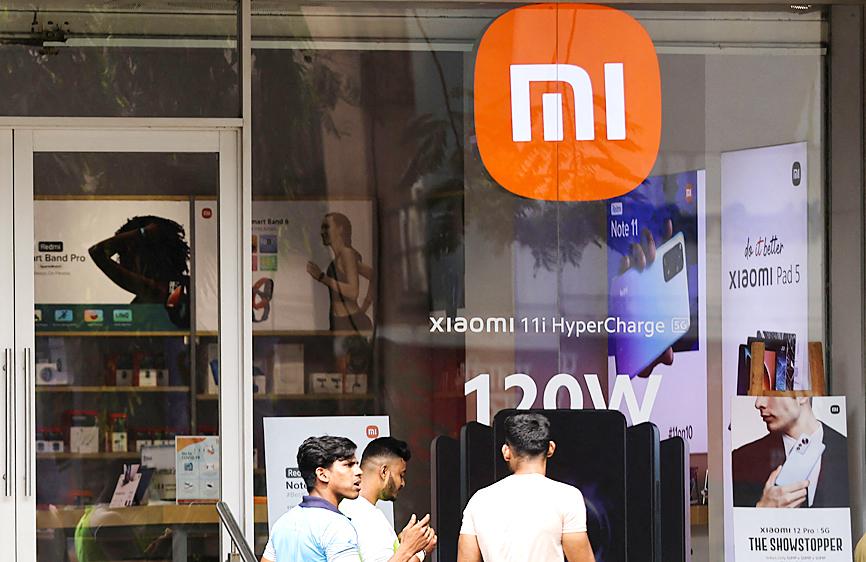Xiaomi Corp (小米) is facing difficulties getting regulatory approval for its electric vehicle (EV) project in China, an unexpected hurdle for the smartphone giant’s US$10 billion endeavor.
The Beijing-based company has been talking to officials at the Chinese National Development and Reform Commission about the licensing for months without success, people familiar with the matter said.
Xiaomi is one of the later would-be entrants to a Chinese EV sector already teeming with rivals, including longer-established names BYD Co (比亞迪) and Nio Inc (蔚來).

Photo: Reuters
Billionaire Xiaomi cofounder Lei Jun (雷軍), who has said that EVs would be his final start-up endeavor, hopes the firm’s expertise in connected technologies and building loyal user communities can translate in the world’s biggest EV market.
However, the longer the delay in securing a license, the bigger the head start its rivals will gain.
The smartphone and electronics maker is pursuing new growth areas after logging its first sales decline on record in the first quarter of this year.
While some Xiaomi executives are hopeful the regulator will eventually approve the EV project, others worry the process will delay the company’s plans, said one of the people, who asked not to be named discussing internal matters.
Xiaomi incorporated its EV subsidiary in September last year, allowing the company to begin the application process.
Shares of Xiaomi yesterday fell as much as 5.4 percent in Hong Kong.
A company representative declined to comment.
The commission did not immediately respond to a fax seeking comment.
Xiaomi’s difficulty in securing a license in China could hinder its EV development and postpone the debut planned for 2024.
The delay could prolong the drag from hefty research-and-development expenses, as well as fixed asset investments, and might weigh on its market share as China’s EV segment is getting increasingly crowded with fast-growing rivals Nio, Xpeng Inc (小鵬) and Li Auto Inc (理想汽車).
China has been stepping up scrutiny of the EV sector, after a rush into the industry led to a spate of high-profile bankruptcies.
New EV applicants are asked to submit a series of documents to prove their financial and technological capabilities, and the review process can take months.
The Chinese government sometimes also rejects applications, with companies then back at square one when it comes to the regulatory process.
The absence of a automaking license has had limited impact on Xiaomi’s EV development efforts for now, one of the people said.
The EV division has more than 1,000 employees, and Xiaomi has said that it is planning to mass produce its first vehicle in 2024.
It has acquired land in a southeastern suburbs of Beijing for an assembly plant and bought EV start-ups to add technology.
Lei early last year pledged to invest about US$10 billion over 10 years to make Xiaomi-branded vehicles.
The 52-year-old has largely retreated from the public eye to spend time on the EV project.
A growing number of tech companies from Baidu Inc (百度) to Huawei Technologies Co (華為) are exploring business opportunities in autonomous driving, smart cockpit and power management technologies.

Sweeping policy changes under US Secretary of Health and Human Services Robert F. Kennedy Jr are having a chilling effect on vaccine makers as anti-vaccine rhetoric has turned into concrete changes in inoculation schedules and recommendations, investors and executives said. The administration of US President Donald Trump has in the past year upended vaccine recommendations, with the country last month ending its longstanding guidance that all children receive inoculations against flu, hepatitis A and other diseases. The unprecedented changes have led to diminished vaccine usage, hurt the investment case for some biotechs, and created a drag that would likely dent revenues and

Macronix International Co (旺宏), the world’s biggest NOR flash memory supplier, yesterday said it would spend NT$22 billion (US$699.1 million) on capacity expansion this year to increase its production of mid-to-low-density memory chips as the world’s major memorychip suppliers are phasing out the market. The company said its planned capital expenditures are about 11 times higher than the NT$1.8 billion it spent on new facilities and equipment last year. A majority of this year’s outlay would be allocated to step up capacity of multi-level cell (MLC) NAND flash memory chips, which are used in embedded multimedia cards (eMMC), a managed

CULPRITS: Factors that affected the slip included falling global crude oil prices, wait-and-see consumer attitudes due to US tariffs and a different Lunar New Year holiday schedule Taiwan’s retail sales ended a nine-year growth streak last year, slipping 0.2 percent from a year earlier as uncertainty over US tariff policies affected demand for durable goods, data released on Friday by the Ministry of Economic Affairs showed. Last year’s retail sales totaled NT$4.84 trillion (US$153.27 billion), down about NT$9.5 billion, or 0.2 percent, from 2024. Despite the decline, the figure was still the second-highest annual sales total on record. Ministry statistics department deputy head Chen Yu-fang (陳玉芳) said sales of cars, motorcycles and related products, which accounted for 17.4 percent of total retail rales last year, fell NT$68.1 billion, or

In the wake of strong global demand for AI applications, Taiwan’s export-oriented economy accelerated with the composite index of economic indicators flashing the first “red” light in December for one year, indicating the economy is in booming mode, the National Development Council (NDC) said yesterday. Moreover, the index of leading indicators, which gauges the potential state of the economy over the next six months, also moved higher in December amid growing optimism over the outlook, the NDC said. In December, the index of economic indicators rose one point from a month earlier to 38, at the lower end of the “red” light.